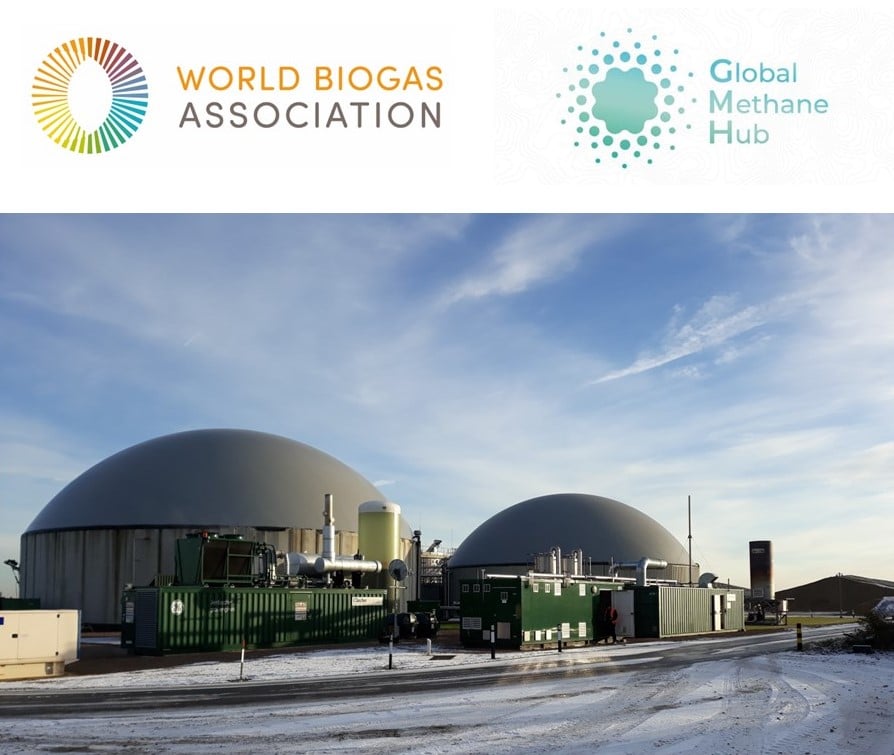
World Biogas Association and Global Methane Hub enter into partnership to develop the groundbreaking International Anaerobic Digestion Certification Scheme and Biogas Regulatory Framework
Ever since its launch at COP22 in 2016, the World Biogas Association (WBA) has sought to demonstrate the importance of recycling the organic wastes humans generate every year and drive the growth of technologies such as anaerobic digestion (AD), biogas and complementary technologies which extract the most value from these resources.
Five years later, at COP26 in Glasgow, the USA and EU launched the Global Methane Pledge, which commits the more than 150 country signatories to the Pledge to reduce methane emissions by 30% against 2020 levels by 2030. Capturing and recycling the 105bn tonnes of organic wastes generated by human activity each year into biogas, biofertilisers and other valuable bioproducts, would deliver close to 50% of the Pledge, whereas today, only 2% of these wastes are recycled.
In light of the above and to catalyse action, in 2023, the WBA launched its groundbreaking #MakingBiogasHappen (MBH) programme, a series of interlinked initiatives aimed at rapidly accelerating biogas adoption and removing barriers to growth.
Commenting on the launch, WBA Chief Executive Charlotte Morton OBE said: “Speed is of the essence if we are to achieve this critical but imminent target of 2030 – just 6 years away. Hundreds of thousands of biogas plants will need to be built globally and not only quickly but safely. This can only be achieved if we ensure that the right regulatory framework and common standards are in place and deployed in every country.”
Today, WBA is delighted to announce that, in collaboration with the Global Methane Hub (GMH), and support from our corporate partners, TotalEnergies and GHD Engineering, two key elements of MBH can now be developed – namely the International Anaerobic Digestion Certification Scheme (ADCS International) and the Biogas Regulatory Framework
By laying out the regulations and policies that are needed to implement, standardise, monitor and control a high-performing biogas industry, the Biogas Regulatory Framework will aim to deliver a standardised template based on best practice examples from across the globe which can then readily be adapted for specific country deployment, and made available for regulators to download on demand.
Similarly, ADCS International will aim to deliver the world’s first international, biogas specific Certification Scheme designed to improve the health, safety, environmental and operational performance of biogas plants and ensure plant operators and managers are competent in their roles. The scheme will also include a standardised Life Cycle Analysis (LCA) linked to biomethane certificates to demonstrate, incentivise and maximise AD plant decarbonisation. By bringing together knowledge, expertise and best practice examples from around the world, the first phase of each programme will focus on delivering standardised templates which countries can then adapt to their specific deployment needs.
As part of the partnership, the GMH has agreed to fund Phase 1 of ADCS International in full, and part-fund Phase 1 of the Biogas Regulatory Framework alongside our corporate partners, TotalEnergies and GHD, so work is expected to start on these two groundbreaking initiatives imminently.
Reacting to the partnership agreement, WBA Chief Executive Charlotte Morton OBE commented: “Recycling the huge volumes of organic wastes humans produce every year is critical if we are to prevent the pollution of our rivers and oceans, and the methane emissions they release if not treated. Given the urgency of climate and ecological breakdown, we must achieve the construction of the necessary infrastructure at breakneck speed – which can only be done safely and professionally if the necessary standards are in place. Both these schemes will empower countries to develop these industries, protecting their citizens and creating tens of millions of new jobs to design, build and operate the infrastructure – a ‘win’ for the environment on which all our lives depend, and a ‘win’ for economies around the world.”
Marcelo Mena, CEO of the Global Methane Hub, added: “Methane emissions have been steadily and silently growing these last decades, which makes the case of reducing this greenhouse gas one of the fastest single strategies for addressing rising temperatures globally. Unmanaged biogas from waste disposal is one of the largest contributors of methane emissions and therefore clear standards and frameworks for reducing and managing are critical for catalysing the transformation we need to witness in the sector.
“Organic waste recycling, including anaerobic digestion, is an effective means for reducing rising emissions from the sector once other preferred options, such as waste prevention and food redistribution have been extinguished or continue to be deployed in the coming years. We are glad to see a globally recognized association such as WBA pioneering and steering these efforts that can certainly guide public-private efforts in combating climate change in the waste and food sectors.”
-ENDS-
For further information, contact:
Jocelyne Bia, Senior Communications Consultant
e: jbia@worldbiogasassociation.org ; tel: +44 (0)20 3176 0592
Notes to Editors:
- Launched at COP22 in Marrakesh in 2016, the World Biogas Association is the global trade association for the biogas, landfill gas and anaerobic digestion (AD) sectors, and is dedicated to facilitating the recycling of all organic wastes and residues through biogas globally. It believes that the global adoption of biogas technologies is a multi-faceted opportunity to produce clean, renewable energy, bioCO2 and natural fertilisers while resolving global issues related to development, public health, and economic growth. www.worldbiogasassociation.org
- The Global Methane Hub is a philanthropic effort from more than 20 leading foundations that pooled their resources to accelerate action by governments, civil society, researchers, investors, and the private sector to develop and implement strategies that will catalyze rapid systemic reductions in methane emissions in the energy, agriculture, and waste sectors. Our global priority actions include Raising the prominence of methane, Accelerating methane policy globally to support and accelerate national and subnational action, Steering public and private finance towards methane mitigation, and Tracking emissions with greater transparency and access to data for everyone. www.globalmethanehub.org

